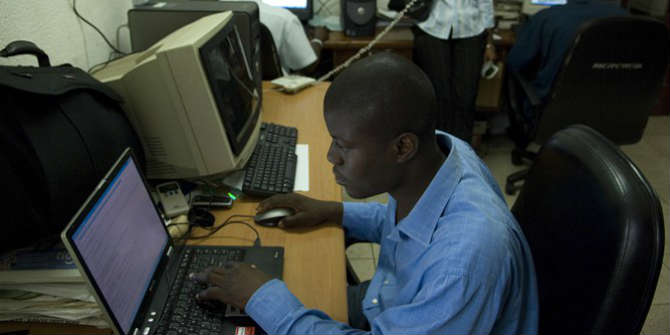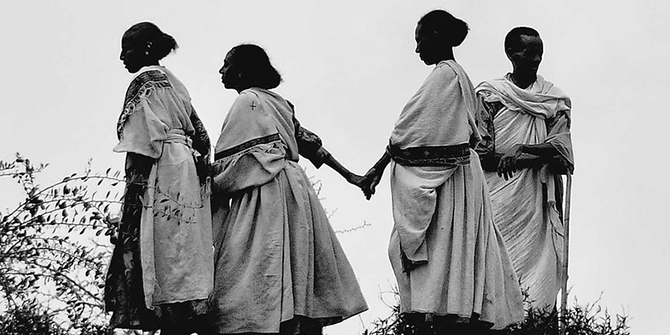LSE’s Savita Bailur and Emrys Schoemaker explore how young people in Ghana, Kenya and Uganda use mobile internet.
“I am into like this video editing … wedding programs, wedding invitation, I do it for them like it’s in a form of video so I use my mobile phone. And I have this app, I have [put] some of the jobs that I do like the video editing on OLX so that is where people call to find out how I go about it”. Senanu, 24 year old teaching assistant, Ghana
Kenya female facilitator: “Okay, someone else do you know other people who use digital technology, to find work? Linda…”
Linda: “No.”
Kenya female facilitator: “You don’t know of people or friends who use digital technology to find work?”
Linda: “I do but I don’t know how they do it.”
For most of 2015, we conducted a research study for Caribou Digital and MasterCard Foundation on ICT use in sub-Saharan Africa, with our key research question: “What do young users in Ghana, Kenya and Uganda from low-income areas use mobile internet for?” This follows increasing evidence that the majority of internet content is accessed through mobile devices, particularly in Africa, considered “the ‘mobile’ continent”[1]. To answer this question, we ran ten focus groups, five with men, and five with women in each country. Each of the focus groups was on different themes – news, music, gaming, and two groups on skills and job-seeking. We talked to a total of 200 18-24 year olds, living in peri-urban areas (fringes of Accra and Jinja, and Limuru and Thika on outskirts of Nairobi), first-generation urbanites (i.e. parents working in agriculture, families still likely owning or working on land), with an income of under $2 a day.

Unsurprisingly, the majority of use is listening to music, sharing YouTube videos, playing games and online betting (e.g. Sport Pesa in Kenya). There are a mix of global favourites (Candy Crush, Mortal Kombat and Temple Run) and local ones (e.g. Mdundo for music in Kenya). We found users comfortable with Facebook and WhatsApp of course, but also filesharing, music and games downloading (e.g. Wapdam and Waptrick) and news apps. Sharing and downloading is skillfully negotiated – finding a friend who runs a cybercafé and using their wifi, Bluetooth, flash-sharing and sharing media through WhatsApp. News and music is much more personalised than if it was non-digital (i.e. users decide what they want to access and likely not pay).
At the same time, mobile internet is used for income-generation, education and job-seeking. In Ghana, one young man calls mobile internet great for “pakapaka”: small, informal jobs like printing a document forwarded to you for a fee, charging for downloading an app etc. There is particular use of photography – taking pictures of items and selling on OLX and for advertising oneself and services (ranging from website design to cooking).
In terms of education, there is use both to support in-school education (e.g. using pdf readers on mobile phones to save on the cost of buying textbooks) as well as supporting self-study. Steve in Kenya says:
“I think every day is a learning day … if you are in a certain profession and you don’t go online studying what is happening you are doomed to fail miserably because maybe you will not be able to keep up with the current trends”.
Searching for jobs is an important function of mobile internet use. A contract road worker who is always looking for new opportunities asks a friend to take photos of him while working, and then sends it to prospective employers. Another focus group participant, Geffrey, 19, works as an usher while he studies and says “as ushers, you can take picture and put it on Facebook … if you are looking for ushers, contact this and this and this”.
First, we find that we cannot make clear distinctions between “entertainment” and “development/instrumental” use. Consider this interaction with an 18-year-old from Uganda: “I have 2500 friends on Facebook … I have friends in Uganda, Tanzania, Philippines, India, America, Russia, Italy … we just chat … where do you stay, do you have a family, what do you study”. But when probed by the facilitator as to why he chats he says “to get maybe the job, to stay there … outside Africa, even to study”. The initial “social” aspect of the interaction also has an “instrumental” purpose. We need to understand this blurring and not dismiss entertainment or social media as purely frivolous.
Secondly, even in this preliminary study, we find a difference between male and female use and confidence with mobile internet (particularly for job seeking) and we need more research on this (see Linda at the top of this blog). And finally, we need to think about training and awareness raising – not only on use but also on privacy, security and other more problematic issues. As 23-year-old Winston who is job-hunting (in Kenya) says: “not everyone can be able to operate a mobile phone, there are some who have never used at all, so when it comes to the smart phone it’s expensive for them to buy so for the future I think the companies can be able to provide education sessions for people who can’t operate the phones so that they can be able to get a certain knowledge … in future many people will be using smart phones”.
This article is based on research conducted as part of a study for Caribou Digital with thanks to MasterCard Foundation, iHub (Kenya), Yes (Ghana) and Restless Development (Uganda). Read the full study. We will be publishing more on different aspects of this study. For more, please contact @savitabailur and @emrys_s
Savita Bailur is a Guest Lecturer in LSE’s Department of Media and Communications and a Researcher at Caribou Digital. Emrys Schoemaker is a doctoral researcher in LSE’s Department of International Development at LSE.
The views expressed in this post are those of the authors and in no way reflect those of the Africa at LSE blog or the London School of Economics and Political Science.





